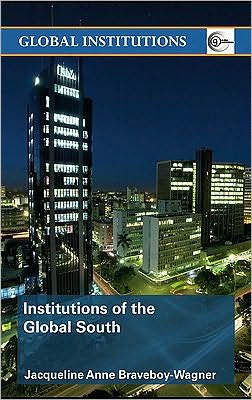Institutions of the Global South” by J.A. Braveboy-Wagner. Routledge Global Institutons, 2008. 272 pages, $30.24 (www.amazon.com)
The concept of the Global South has become popular among analysts and policy makers over the past decades, increasingly replacing the term “Third World”- which referred to the Africans, Asians, and Latin Americans, that is, the people of the countries located roughly in three southern continents who shared a history of underdevelopment and colonialism – and were often members of the Non-Aligned Movement (NAM) and the G77. “Global South”, by contrast, seems to be more neutral and less tied to the region’s troubled past – and thus more apt for articulating a new narrative that no longer implies weakness, but that may also be tied to positive aspects such as high growth and the capacity to influence the global agenda.
While differences between countries of the Global South are considerable – as the BRICS’ or IBSA’s incapacity to represent developing countries as a whole show – the term remains a useful handle to analyze a group of countries that – notwithstanding the forces of globalization and the aspirations of liberalism and forms of cosmopolitanism—continue to see their problems, and to construct their narratives, quite differently from those of the developed nations of Europe, North America, and Asia.
Braveboy-Wagner’s book deals with the Global South’s international institutions – a fascinating topic as understanding the history of groupings such as the Non-Aligned Movement (NAM), the G77 and OPEC are crucial to put into perspective how developing countries engage with and think about global governance today. The author also offers a concise and very accessible account of institutional manifestations of concepts such as Pan-Africanism, Pan-Arabism and Pan-Americanism, ideas that until today have a strong influence on how countries think about regionalism. The book is also mandatory reading for those studying more recent groupings such as BRICS and IBSA, which are – to some degree – tied to ideas of third world solidarity, which had its origin 1955 in Bandung. In the same way, it makes an interesting contribution to today’s debate about whether South-South cooperation is or should be qualitatively different from North-South cooperation.
The inclusion of a detailed history of OPEC may strike some as odd, yet it is highly useful as it reminds the reader of the great diversity of institutions established by developing countries- perhaps the book’s main message. As with the NAM and the G77, the author carefully analyzes the tensions between South-South solidarity and national interest, which proved to be particularly difficult to deal with whenever an intra-group conflict arose.
Braveboy-Wagner also defends the inclusion of the OAS. She concedes that the membership of a superpower makes the institution a hybrid north–south entity, yet points out that it still bears a Latin American stamp.
Most impressively, the book contains an incredibly detailed description not only of the pan-African AU, but also of the many regional (and often overlapping) outfits in Africa – including little known clubs as the Community of Sahel-Saharan States (CEN-SAD). The book thus serves as an excellent coursebook for global governance in the developing world and as introductory reading for diplomats who will serve in Asia, Africa, Latin America or the Middle East. General readers, on the other hand, will prefer to skip parts of the analyses of regional bodies.
Interestingly enough, the book does not mention more recent groupings such as BRICS and IBSA, yet it would have been useful to hear how the author views them against the historic background of South-South cooperation presented in the book. In how far are these new bodies different, and how they can be seen as a continuation of previous efforts in the Global South to institutionalize ties? How does the shift of power away from established actors towards emerging powers such as China and India change the nature of South-South cooperation?
For Braveboy-Wagner, global order continues to be centered around established powers. She argues that
Global south nations have constructed an identity or a set of regional identities out of their common experiences, and that identity fosters cooperation and persists because of the persistence of hierarchy in the international system. Until that hierarchy changes, and until the international system and the states and other units that comprise that system become more inclusive, global south connectivity will be reflected in a growing number of south–south activities and institutions.
Read also:
Book review: “Liberal Internationalism: Theory, History, Practice” by Beate Jahn
Book review: “The rise of the BRICS in Africa” by Pádraig Carmody
Book review: “China Goes Global: The Partial Power” by David Shambaugh









